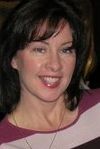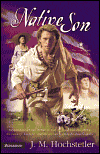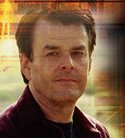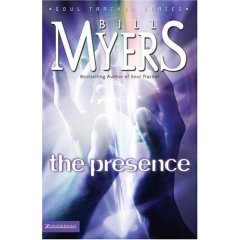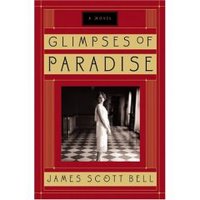
Brandt Dodson comes from a long line of police officers, spanning several generations.He was employed with the Indianapolis office of the FBI and served eight years as a United States Naval Reserve officer. He is a podiatrist and an elder in his church, a past President of the Indiana Podiatric Medical Association, and a recipient of the association’s highest honor, “The Theodore H. Clarke Lifetime Achievement Award”.
Tell us about your upcoming novels.
 I recently signed a three book contract with Harvest House Publishers for a series of mystery novels which feature hardboiled PI Colton Parker. The first of these is:
I recently signed a three book contract with Harvest House Publishers for a series of mystery novels which feature hardboiled PI Colton Parker. The first of these is:Original Sin and is due out in March of ‘06.
The second is: Seventy Times Seven and is due out in August. The third will tentatively be titled: The Root of Evil and is due out in January of ‘07. The novels are set in Indianapolis and I draw heavily on my family’s background in law enforcement, spanning several decades.
Why a mystery?
I wrote what I like to read. I think that is sound advice for anyone.
Christianity and mystery novels have gone hand-in-hand for a long time. Mystery novelist Dorothy Sayers was a renowned theologian, and of course we have the mystery novels of G.K. Chesterton, Andrew Greeley and Ralph McInerny among others.
The mystery is a morality play. Good versus evil. And who better to establish the moral parameters of life, than the God who created it?
Tell us about your journey to publication. How long had you been writing before you got the call you had a contract, how you heard and what went through your head.
At the time Harvest House offered a contract, I had been writing off and on for close to twelve years. Like any writer, I spent most of that time collecting rejection slips. But as time passed, the rejections became less caustic and would often include an encouraging hand written note. Those were the dark days, so any encouragement went a long way in keeping the fires burning. But encouraging or not, they were still rejections.
After I wrote Original Sin I met my editor, Nick Harrison, at the Write To Publish conference in Wheaton, Illinois. Nick was a last minute replacement for another editor who was unable to attend.
One evening, during a critique session that Nick was facilitating, I had a chance to read part of Original Sin and Nick liked it. He asked if I could send the manuscript to him. A few weeks later, he told me he liked the book and wanted to take it before the Publisher’s Committee, who has the final say on what is published.
It was a few months before we heard anything, making it one of the longest periods in my life. When I did hear, Nick told me that the committee was tabling it with the intention of “taking another look” in a few months. He suggested that I write another in the series, to convince them that I was committed to the books.
I wrote the second novel (“Seventy Times Seven”) and sent that to him. Nick liked the second one as well, so both books went back to the committee.
The evening that I heard about the contract offer, I was walking across the campus of Wheaton College while attending the Write To Publish conference again, when my wife called. She told me that I had received an email from Nick and I asked her to read it. When she told me that Nick’s message said that I was being offered a three book contract, I could tell from her voice that she was as excited as I was.
It was surreal. Here I was, standing within a few feet of where I had stood the last time I had talked to Nick, almost a year to the day, receiving the best news anyone can receive who wants to write. And except for my wife, I had no one to tell! It was late evening and everyone had already gone home.
Going back to my room was out of the question, so I celebrated in the only way I could think of at the time. I went to McDonald’s, got a cheeseburger Happy Meal, and ate in my car.
Do you still experience self-doubts about your work?
Some. I’d be concerned if I didn’t.
Writing is a growing process. Each book, chapter, story, etc., should be more ambitious than the one before it. We should always be working toward pushing the envelope, and acquiring new skills while strengthening the old ones. That process is inevitably going to lead to some level of self-doubt. Do I have the skill for this? Can I pull this off?
The key, is to not let the doubt’s paralyze you.
What’s the best advice you’ve heard on writing/publication?
“Write, write, write.” There really is no other way to grow.
What’s the worst piece of writing advice you’ve heard?
“You need an agent.” You don’t.
What’s something you wish you’d known earlier that might have save you some time/frustration in the publishing business?
I wish someone had told me of the value of a good writer’s conference. The benefits are incalculable. There’s no better way to learn new skills, meet editors and build relationships with other writers.
Do you have a scripture or quote that has been speaking to you lately?
Psalm 37:5 “Commit thy way unto the Lord; trust also in him; and he shall bring it to pass.”
This verse is good advice. Commit everything to the Lord - with faith - and He will do the rest.
Is there a particularly difficult set back that you’ve gone through in your writing career you are willing to share?
I haven’t had any major set backs. I suspect that if I am blessed to be able to do this for the rest of my life, I will probably run into snags somewhere along the line, but none so far.
What are a few of your favorite books?
I’d have to begin with Psalms. I can’t think of any book that has been written to date, that speaks so clearly to so many, on the basic fundamentals of life. David experienced it all, every height and every depth. His praise is our praise. His pain is our pain. And he can write to the human condition - and our need for God - like no one else has.
In terms of fiction, “The Maltese Falcon” by Dashiel Hammet, most anything by Raymond Chandler, Robert Crais, Robert Parker, Ross MacDonald, Mickey Spillane, Tom Clancy, Dean Koontz and Jerry Jenkins (pre and post “Left Behind”).
In terms of non-fiction I‘m an eclectic reader. I tend to read biographies, history and science. There’s a new book by Ron Powers on the life of Mark Twain, that has been calling my name.
If your authorial self was a character from The Wizard of Oz, which one would you be and why?
Dorothy. She lets nothing deter her in reaching for her goal.
What piece of writing have you done that you’re particularly proud of and why?
“Original Sin”. The book went through several revisions to become what it is, and I tried very hard to capture the tone of the PI genre while updating it for the current century. The human heart may be the same now as it has always been, but I don’t think “dame” is going to sit well with a lot of readers.
Do you have a pet peeve having to do with this biz?
I will sometimes hear more established writers complaining about some aspect of writing or publishing, and that tends to grate on me a bit. Writing is a privilege. You don’t have to do it. If you don’t like it, do something else.
Can you give us a view into a typical day of your writing life?
I’m still working full-time at another occupation, so my writing day usually begins at around eight in the evening and continues until ten or eleven. I don’t write with an outline, so I look forward to seeing where the story will take me.
Weekends are prime time. I usually try to write six or eight hours on those days whenever possible.
If you could choose to have one strength of another writer, what would it be and from whom?
David wrote the psalms in a way that relates to everyone - thousands of years later. There is virtually no one, who hasn’t felt his anguish or fear at one time or another. Even among those who do not follow Christ, many find comfort in the psalms.
If I could write a book like that, one in which every reader could find a part of themselves, my writing life would be fulfilled.
Do you have a dream for the future of your writing, something you would love to accomplish?
I don’t think anyone who writes could say “no” to your question.
I would like to continue the Colton Parker series that I’ve started for as long as readers express an interest, but I would also like to write some stand alone books which, by their nature, would be more complex in structure. Novels that would ring true to every reader.
President Kennedy once said; “We all inhabit this small planet, we all breathe the same air, we all cherish our children’s future, and we are all mortal.” He might have added, “and we are all in need of Christ.”
I want to write a novel that takes those human needs that we all share, and ties their fulfillment into Jesus Christ.
Was there ever a time in your writing career you thought of quitting?
Oh sure. Lots of times. And I did, lots of times. Though never for very long.
After so many rejections, you tend to wonder, “am I doing the right thing, here?”
I finally had to ask God to either deliver me from this desire to write, or open the door. I said this, while dropping a manuscript in the mail.
If it was rejected, I was done with writing. It’d be time to take up origami.
But if it was published, I promised God I would write for Him as long as he gave me the capacity to do so.
Six days later, the manuscript was accepted for publication.
What is your favorite and least favorite part of being an author?
So far, I haven’t found anything that I truly dislike about writing. Rejection comes with the territory, so anyone who writes needs to be ready for that.
I still struggle with grammar, but it is a tool of the trade and has to be mastered.
I truly love the writing process itself. I enjoy having the creative outlet and being able to work with my editor, during the editing process, on our common goal of making the book as good as it can be.
How much marketing do you do? Any advice in this area?
I’m doing quite a bit. My view has always been that it is the publisher who will get the book in the stores, and I will get it out.
I’m in my initial efforts of promoting “Original Sin” and I’m having a lot of fun. The folks at Harvest House have been great to work with and I’m learning a lot.
I’ve already arranged some signings and I’m trying to approach them in as “scientific” a manner as I can. Since I write mysteries, my initial signings will be at CBA stores and the Independent Mystery Bookseller’s Association stores. The two groups together, account for most of my market and are very helpful - sometimes even hand-selling books they believe in.
I make it a point to support the CBA stores anyway that I can. I make personal contact with every CBA owner/manager and let them know that I appreciate the fact that they are stocking my books.
Radio and print media interviews are helpful also. I try to be as helpful to them as possible by being on time, answering their questions and then letting them know how much I truly appreciate the opportunity that they have given me.
I talk to virtually everyone I know when promoting the book, and I try to build a large core of “first readers”. I have an annual “cook-out” for all of them, to let them know how valuable they are and how much I appreciate them. Of course, a signed copy of the book with an acknowledgment of their help, isn’t a bad idea either.
I also agree to talks and readings at the libraries in my area whenever I can arrange them.
Of course, a website is essential today and should mirror the image or message you want to project.
You should also have no fear of asking for help. Talking to marketing majors at local universities, sales reps you may know, or your publisher’s marketing department are all beneficial.
I think the best advice I’ve heard is to be creative. There is no one technique that will move your books off the shelves. It requires a sustained effort.
Parting thoughts?
I love writing. For me, it is fulfillment.
If anyone reading this interview, finds themselves wanting to write and feeling the call of God to do so, I would say “be persistent”.
Writing is a craft. Learn the craft. Then commit your writing to God.









